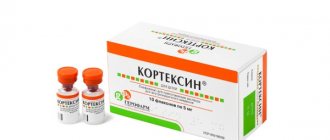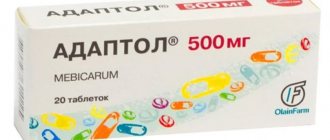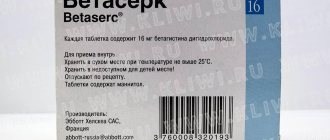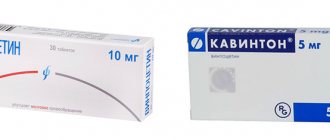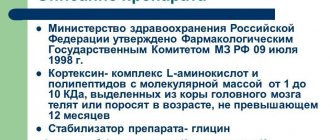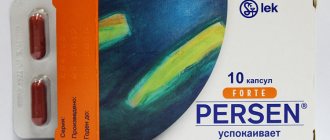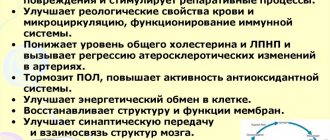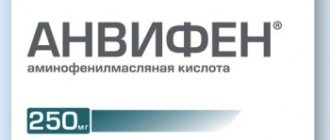Cortexin is a nootropic that increases the brain’s resistance to various damage and promotes rapid recovery of nerve tissue. Actovegin is an antihypoxant that improves the metabolism of all tissues and stimulates their regeneration.
These drugs belong to different groups and have different mechanisms of action:
- Cortexin is a neuropeptide derived from the brain of cattle. Once in the human body, the drug penetrates the blood-brain barrier, normalizes the ratio of excitatory and inhibitory neurotransmitters, reduces the bioelectrical activity of neurons and reduces the formation of free radicals.
- Actovegin improves the oxygen oxidation of glucose, due to which the formation of ATP (energy molecules) increases and energy metabolism is normalized. Fewer free radicals and acids are formed, neurons become more resistant to hypoxia.
pharmachologic effect
An antihypoxic agent that has three types of effects: metabolic, neuroprotective and microcirculatory.
Actovegin increases the absorption and utilization of oxygen; The phospho-oligosaccharides contained in the drug inositol have a positive effect on the transport and utilization of glucose, which leads to an improvement in the energy metabolism of cells and a decrease in the formation of lactate under ischemic conditions. Several ways to implement the neuroprotective mechanism of action of the drug are being considered.
Actovegin prevents the development of apoptosis induced by beta-amyloid (Aβ25-35).
Actovegin modulates the activity of nuclear factor kappa B (NF-kB), which plays an important role in the regulation of apoptosis and inflammation in the central and peripheral nervous system.
Another mechanism of action involves the nuclear enzyme poly(ADP-ribose) polymerase (PARP). PARP plays an important role in the detection and repair of single-stranded DNA damage, but excessive activation of the enzyme can trigger cell death in conditions such as cerebrovascular disease and diabetic polyneuropathy. Actovegin inhibits PARP activity, which leads to functional and morphological improvement in the central and peripheral nervous system.
The positive effects of the drug Actovegin, affecting the processes of microcirculation and the endothelium, are an increase in the speed of capillary blood flow, a decrease in the pericapillary zone, a decrease in the myogenic tone of precapillary arterioles and capillary sphincters, a decrease in the degree of arteriovenular shunt blood flow with preferential blood circulation in the capillary bed and stimulation of the function of endothelial nitric oxide synthase , affecting the microvasculature.
In the course of various studies, it was found that the effect of the drug Actovegin occurs no later than 30 minutes after taking it. The maximum effect is observed 3 hours after parenteral and 2-6 hours after oral administration.
General information about Actovigen
Actovegin belongs to the same group of drugs and is also of animal origin. It is made from the blood of young calves using the filtration method. It is completely purified from proteins, so it practically does not cause allergies.
Produced in the form:
- gels and ointments for external use;
- injections in ampoules for intramuscular administration;
- liquid suspensions in dropper bottles;
- tablets for oral use.
The medicine is released in finished form, and its preliminary dilution is not required.
Dosage
The drug is taken orally before meals. Do not chew the tablet, take it with a small amount of liquid.
In the acute period of ischemic stroke (starting from days 5-7) - 2000 mg/day intravenously, up to 20 infusions, switching to tablet form, 2 tablets. 3 times/day (1200 mg/day). The total duration of treatment is 6 months.
For dementia - 2 tablets. 3 times/day (1200 mg/day). The total duration of treatment is 20 weeks.
For peripheral circulation disorders and their consequences - 1-2 tablets. 3 times/day (600-1200 mg/day). Duration of treatment is from 4 to 6 weeks.
For diabetic polyneuropathy - 2000 mg/day IV drip, 20 infusions with switching to tablet form, 3 tablets. 3 times/day (1800 mg/day). Duration of treatment is from 4 to 5 months.
Which remedy is more effective?
Which remedy is more effective should be decided only by a medical specialist. The drugs have many similarities. They are used for cerebrovascular accidents, head injuries, encephalopathies, and cognitive disorders.
There are situations when one of them is more suitable. It is also worth considering the range of patients for whom these medications are not contraindicated. Thus, Cortexin is used to treat childhood pathologies from birth, but is contraindicated for pregnant and nursing mothers. Actovegin, on the contrary, has positive effects in complicated pregnancies, but is less often used to eliminate childhood pathologies.
Side effects
The frequency of side effects was determined according to the classification of the Council of International Organizations of Medical Sciences (CIOMS): very often (≥1/10); often (≥1/100 to <1/10); uncommon (≥1/1000 to <1/100); rare (≥1/10,000 to <1/1000); very rare (<1/10,000); frequency unknown (cannot be estimated from available data).
From the immune system: rarely - allergic reactions (drug fever, symptoms of shock).
From the skin and subcutaneous tissue: rarely - urticaria, sudden redness.
Main differences
So, what is the difference between Cortexin and Actovegin? The first medication is successfully used in therapies for dyscirculatory encephalopathy. The same cannot be said about Actovegin. For this pathology, this medication is only applicable in combination with the first one. Doctors practice injections of drugs one at a time, every other day.
Cortexin is the only medication that is suitable for treating children with central nervous system injuries. Its use usually gives good results.
Cortexin cures chronic fatigue faster. But it is prohibited for use by pregnant and nursing mothers, while Actovegin has no such restrictions. They also differ in price - Actovegin is much cheaper.
Cortexin copes more effectively with hypoxic and traumatic brain damage. Although Actovegin works well in the treatment of vegetative-vascular dystonia, it can provoke nervous-reflex overexcitation. Therefore, if the patient is prone to hysteria or nervous attacks, it is better to carry out therapy with Cortexin.
Both medications are rarely used at the same time, since serious allergic reactions are likely, but such a prescription is possible.
special instructions
Clinical data
In the multicenter, randomized, double-blind, placebo-controlled ARTEMIDA trial (NCT01582854), which examined the therapeutic effect of Actovegin on cognitive impairment in 503 patients with ischemic stroke, the overall incidence of serious adverse events and death was similar in both study groups. Although the incidence of recurrent ischemic strokes was within the expected range in this patient population, there were more cases in the Actovegin group compared with the placebo group, but this difference was not statistically significant. The relationship between the incidence of recurrent stroke and the study drug has not been established.
Use in pediatrics
Currently, there is no data on the use of the drug Actovegin in pediatric patients, so the use of the drug in this group of people is not recommended.
Impact on the ability to drive vehicles and operate machinery
Not installed.
General information about Cortexin
Cortexin is classified as a polypeptide bioregulator because it is a drug of animal origin. It is made from extracts of the cerebral cortex of piglets and calves. The healing substance – cortexin – is a polypeptide fraction. Glycine is an auxiliary component that regulates the metabolic process.
Areas of application of the drug
Its release form is a sterile lyophilized powder of 5 and 10 mg. It is packaged in bottles and intended for dilution with saline solution. It is used both in adult practice and pediatrics.
Patient reviews
Ksenia, 26 years old, Tomsk
I took Actovegin on the advice of a doctor during pregnancy to improve the nutrition of the placenta in combination with Curantil. The doctor recommended a tablet form of the drug. The price of the product is high; one bottle of the drug is not enough for a course of treatment. I did a follow-up ultrasound and the results improved.
Elena, 2 years old, Omsk
At 3 years old, the child spoke poorly and did not want to eat. We went to a neurologist and prescribed a massage and Cortexin injections. Injected with Novocaine. My son complained a little about pain after the injection. The first course did not help, but the doctor said to pierce it again after 7 months. Now my son is 4 years old and improvements are noticeable.
In neurology, drugs such as Actovegin and Cortexin have become widespread. Both medications belong to the pharmacological group of nootropics and have similar prescription recommendations.
The drugs are used to normalize blood circulation in the brain tissues and improve its functioning, as well as to enhance the emotional background.
Characteristics of Actovegin
Actovegin is a pharmacological agent whose active substance is a deproteinized hemoderivative obtained from calf blood.
The product is produced in several dosage forms:
- injection solution;
- infusion solution;
- tablet form;
- cream;
- gel for external use;
- eye gel;
- ointment.
The use of the drug helps accelerate metabolic processes in the tissue structures of the central nervous system. External use of cream, ointment or gel ensures activation of regeneration processes of damaged tissues and improvement of trophism. The active component of the drug is obtained using dialysis and ultrafiltration methods.
Under the influence of the active compound in humans, an increase in tissue resistance to hypoxia is observed, this is due to the ability of the drug to improve the process of utilization and oxygen consumption. Under the influence of the drug, activation of energy metabolism is observed.
Actovegin is able to influence the process of glucose absorption, exhibiting insulin-like activity, therefore the use of this medication by people suffering from diabetes leads to the restoration of lost sensitivity and a decrease in the severity of symptoms associated with mental disorders.
Indications for use of the drug in tablet form are:
- treatment of ischemic stroke;
- dementia;
- lack of blood flow in the brain;
- disorders caused by TBI;
- diabetic polyneuropathy;
- arterial and venous vascular disorders, manifested by trophic ulcers and angiopathy.
Administration of the drug in the form of intramuscular injections and intravenous injections to an adult is prescribed in similar cases.
Actovegin ointment and gel are used in the treatment of:
- inflammatory processes on the skin and mucous membranes;
- burns, abrasions, cuts, cracks, etc.;
- weeping ulcers, varicose origin.
Actovegin is able to influence the process of glucose absorption, exhibiting insulin-like activity, which is why the use of this medication by people suffering from diabetes.
The drug is recommended for use to activate tissue regeneration after burns, for the treatment and prevention of bedsores and to prevent skin manifestations associated with the effects of radiation.
Actovegin can be used to improve the performance of athletes.
Contraindications to the prescription of the drug are:
- oliguria;
- pulmonary edema;
- fluid retention;
- anuria;
- decompensated heart failure;
- presence of hypersensitivity.
During drug therapy using Actovegin, the patient may experience the following side effects and undesirable reactions:
- hives, swelling, heavy sweating, increased body temperature, hot flashes;
- vomiting, nausea, dyspeptic symptoms, pain in the epigastric region, diarrhea;
- tachycardia, pain in the heart, pallor of the skin, shortness of breath, arterial hypertension or hypotension;
- weakness, headaches, dizziness, agitation, loss of consciousness, tremor;
- feelings of tightness in the chest, rapid breathing, difficulty swallowing, sore throat, feeling of suffocation;
- lower back pain, pain in joints and bones.
To eliminate side effects caused by the use of the drug, symptomatic therapy is used.
If high dosages are used, the patient may develop disorders of the gastrointestinal tract. To eliminate the consequences of an overdose, symptomatic treatment is used.
All dosage forms of the drug are sold in pharmacies only after presentation of a prescription from the attending physician; the doctor must fill out the prescription in Latin.
The shelf life of the drug in tablets is 5 years; in the form of a solution, the drug is stored for 3 years.
The cost of the product varies depending on the dosage form in the range from 100 to 1250 rubles.
Analogs
If Cortexin is not suitable, the use of similar drugs is prescribed. Among them are:
Axotilin.- Dentrix.
- Diphosphocin.
- Kwanil.
- Kemodin.
- Neurodar.
If it is necessary to replace Actovegin, the use of its analogues is prescribed, namely:
- Cortexina.
- Mexidol.
- Vero-Trimetazidine
- Dipyridamole.
- Nobena.
Only the attending physician can replace one drug with another. Changing your treatment regimen on your own can cause serious harm to your health.
Contraindications
The use of Cortexin is contraindicated for patients who have hypersensitivity to the main active ingredient or glycine.
Clinical studies aimed at identifying the effect of the drug on the body and the developing fetus in a pregnant woman have not been conducted. For this reason, the pharmacological agent is not recommended for the treatment of women during pregnancy and breastfeeding.
If it is absolutely necessary to prescribe medication during lactation, it is recommended to stop breastfeeding.
The following pathological conditions are contraindications to the use of Actovegin:
- oliguria;
- pulmonary edema;
- fluid retention;
- anuria;
- high sensitivity.
In the case of using droppers to administer the drug, a contraindication may be the presence of a decompensated form of heart failure in the patient.
Reviews from doctors
Konstantin, neurologist, 39 years old, Yalta
I consider Actovegin the best drug among existing analogues. The medicine provides an increased supply of blood and oxygen to tissue cells. When using the drug, headaches, anxiety, restlessness and memory problems are well eliminated.
Svetlana, therapist, 47 years old, Vologda
Cortexin is an effective drug. I prescribe it as part of complex therapeutic measures in the treatment of psychosomatic problems. Effective in the treatment of certain addictions. The medicine combines well with other medications, and the risk of side effects is minimal.
Interaction with other tools
Both drugs do not interact with other medications. Therefore, they can be used in complex treatment.
The only warning may be that you should not mix medications when administered. It is better to prescribe their administration one by one.
In addition, it is important to consider the following features:
- Cortexin is not compatible with drugs that have a peptide structure.
- Actovegin should be carefully combined with potassium supplements, potassium-sparing diuretics and ACE inhibitors.
Patient reviews
Actovegin was prescribed in combination with Phlebodia for varicose veins, after the course the skin on the legs acquired a normal color and the pain went away.
Anastasia, 35 years old
Cortexin is a good drug. My daughter was prescribed 5 mg, but she developed an allergy. The doctor divided the dose into 2 doses, the allergic reaction disappeared, and the child’s condition improved.
The average price of Cortexin in Russia is 1100-1200 rubles. per package with a 10-milligram dosage of the drug and 700-850 rubles. per package at a dosage of 5 mg.
Actovegin in ampoules costs 1280 rubles. for 5 pieces, in the form of a solution for infusion - 550 rubles. for 250 ml. The cost of the drug in ampoules for injections is 800 rubles. per pack of 5 ampoules.
As a specialist, I assure you that neither Cortexin nor Actovegin should be taken. And change the specialist who offers them to you for a more adequate one. Both drugs, without scientifically proven effectiveness and safety, are not used in civilized countries. Here is medical information on them:
Here's another source:
If the doctor who suggested these drugs to you does not read modern medical literature, you can print this information out to him.
It depends on why you are prescribed these drugs.
I am familiar with both Cortexin and Actovegen.
We were prescribed it for the development of speech in the child, as there were problems with this.
We took the first course of Cortexin; the injections were quite painful, we didn’t notice much of an effect, but there were no side effects either; by the way, the drug is not the cheapest.
Then there was another course of Actovegen, this drug was cheaper than the first, and the difference was significant, but the result was the same, there were no side effects.
And the third drug, called Cerebrolysin, helped us best - its effect was noticeable.
So it’s hard to say, drugs act differently on all people, everything is selected by trial and error.
Can I take it at the same time?
Both pharmacological agents are compatible. The drugs can be injected simultaneously to obtain an enhanced therapeutic effect. However, you should not give such injections in one go and mix the medications in a syringe.
The disadvantage of this method of carrying out therapeutic measures is the frequent occurrence of allergic reactions to the combined use of medications. This requires the patient to be screened for allergies using a test before administering therapy.
When administering intramuscularly, the medicine must be drawn into different syringes and injections are given in this form. It is advisable to carry out all manipulations one by one during the period of therapeutic measures.
Simultaneous injections of drugs are often prescribed in childhood when receiving various birth injuries or when disturbances in the functioning of the body’s nervous system are detected.
